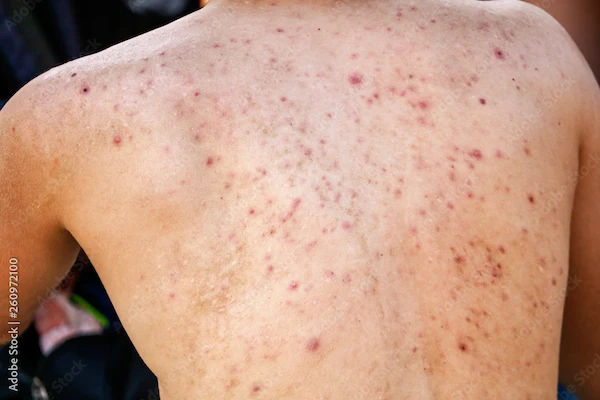How To Reduce Pimple Marks?
Want to fade pimple marks naturally? Discover effective home remedies, topical treatments, and professional options to reduce hyperpigmentation and scars for clearer skin.

Written by Dr.Sonia Bhatt
Last updated on 3rd Jul, 2025

Dealing with pimple marks can be frustrating, especially when the acne is gone but the stubborn marks remain. These marks, also known as postinflammatory hyperpigmentation (PIH) or scars, can affect your confidence. The good news is that with the right care and treatments, you can reduce their appearance and achieve clearer skin.
Understanding Pimple Marks
Pimple marks are dark or red spots left behind after a pimple heals. They occur due to inflammation and excess melanin production (the pigment that gives skin its color). In some cases, deeper acne can also lead to pitted or raised scars.
Types of Pimple Marks
The types of pimple marks are as follows:
Post-Inflammatory Hyperpigmentation (PIH): These are flat, darkened spots that occur after inflammation and typically fade gradually over time as the skin renews itself.
Post-Inflammatory Erythema (PIE): These red or pink marks are the result of damaged or newly formed blood vessels (capillaries) near the skin's surface after a pimple has healed.
Acne Scars: These are textural changes in the skin, which can present as depressed (atrophic) indentations or raised (hypertrophic) bumps, and often require medical interventions for significant improvement.
Causes of Pimple Marks
The causes of pimple marks are as follows:
Picking or Popping Pimples: Manipulating blemishes worsens inflammation and significantly increases the likelihood of developing permanent scars.
Severe Acne: More severe forms of acne, such as cystic or nodular acne, penetrate deeper into the skin and are therefore more prone to leaving noticeable marks.
Sun Exposure: Ultraviolet (UV) rays from the sun darken existing pimple marks, making them more prominent and also slowing down the skin's natural healing process.
Skin Type: Individuals with darker skin tones have a higher concentration of melanin, making them more susceptible to post-inflammatory hyperpigmentation, which can result in more noticeable and persistent pimple marks.
How to Reduce Pimple Marks Naturally?
Results from both natural and medical treatments vary based on individual skin type and the depth of pigmentation or scarring, so expectations should be realistic and progress monitored over time. Reduce pimple marks naturally as follows:
Keep Your Skin Hydrated: Using a gentle moisturizer with ingredients like hyaluronic acid or ceramides helps maintain skin plumpness and health, making marks less noticeable.
Use Sunscreen Daily: Applying a broad-spectrum sunscreen with an SPF of 30 or higher every morning, even when indoors, prevents sun exposure from darkening pimple marks and hindering healing.
Try Natural Remedies (With Caution): While aloe vera soothes skin and promotes healing, honey offers antibacterial and brightening effects, and diluted lemon juice contains vitamin C, remember to patch test due to potential irritation.
Exfoliate Gently: Chemical exfoliants like AHAs (Glycolic Acid, Lactic Acid) help lighten pigmentation, and BHAs (Salicylic Acid) unclog pores and reduce inflammation, aiding in the fading of pimple marks, but avoid harsh scrubs that can irritate the skin.
Consult Top Dermatologist for Stubborn Marks
Medical Treatments for Stubborn Marks
If natural remedies don’t work, dermatological treatments can help:
Topical Treatments:
Applying a Vitamin C serum can help brighten the skin and reduce the appearance of hyperpigmentation left by pimples.
Retinoids are topical medications that can boost collagen production and accelerate skin cell turnover, aiding in the fading of acne marks.
Niacinamide, a form of vitamin B3, can help reduce inflammation and even out skin tone, improving the appearance of post-inflammatory hyperpigmentation.
Professional Treatments:
Chemical peels involve the application of a chemical solution to remove the top layers of skin, which can effectively fade pimple marks.
Microneedling is a procedure that creates tiny punctures in the skin to stimulate collagen production, ultimately improving skin texture and reducing the visibility of scars.
Laser therapy utilizes focused light energy to target pigmentation and scars, offering a highly effective method for reducing the appearance of pimple marks.
Lifestyle Tips to Prevent & Reduce Pimple Marks
The lifestyle tips to prevent and reduce pimple marks are:
Avoid Picking Pimples: Allowing pimples to heal naturally without interference is crucial in minimizing the risk of scarring and the formation of lasting marks.
Follow a Consistent Skincare Routine: Regularly cleansing, moisturizing, and protecting your skin with sunscreen daily helps maintain its health and can prevent new breakouts that might lead to marks.
Eat a Balanced Diet: Incorporating foods rich in antioxidants, such as berries and leafy greens, and zinc, found in nuts and seeds, can support skin health and healing.
Stay Hydrated: Drinking an adequate amount of water aids in flushing out toxins from the body and helps maintain skin hydration, which is essential for healthy skin function.
Manage Stress: Reducing stress levels is important as stress can exacerbate acne breakouts, which in turn can increase the likelihood of developing pimple marks.
When to See a Dermatologist?
If your pimple marks:
Don’t fade after several months
Are deep or pitted
Cause emotional distress
A dermatologist can recommend personalized treatments for faster results.
Need Expert Advice?
If you’re struggling with persistent pimple marks, consult a dermatologist on Apollo 24|7. Book an online consultation or schedule a skin analysis today for expert guidance!
Conclusion
Pimple marks take time to fade, but with patience and the right care, you can achieve smoother, clearer skin. Stick to a gentle skincare routine, protect your skin from the sun, and consider professional treatments if needed. Remember, healthy skin is a journey—be kind to yourself along the way! Would you like personalised skincare recommendations? Chat with a dermatologist now on Apollo 24|7!
Consult Top Dermatologist
Consult Top Dermatologist for Stubborn Marks

Dr. Bhavya Swarnkar
Dermatologist
14 Years • MBBS, MD, DNB (Dermatology, Venereology & Leprosy) Former Senior Resident, Department of Dermatology- AIIMS, New Delhi. Associate Consultant - Dermatology.
Bilaspur
Apollo Hospitals Seepat Road, Bilaspur
(225+ Patients)

Dr. Tejaswi Cherukuri
Dermatologist
11 Years • MBBS, MD (DVL), FAM, FAAD
Chennai
Apollo Speciality Hospitals OMR, Chennai
(25+ Patients)

Dr. S Madhuri
Dermatologist
10 Years • MBBS, MD. DVL, DNB, Fellow (Dermatosurgery & Lasers)
Secunderabad
Apollo Hospitals Secunderabad, Secunderabad
(300+ Patients)

Dr. Pranoti Deshpande
Dermatologist
5 Years • MBBS, MD (Dermatology, Venereology and Leprosy)
Hyderabad
Apollo Hospitals D R D O kanchanbagh, Hyderabad
(150+ Patients)
Dr. Syeda Sarwath Saniya
Dermatologist
5 Years • MBBS,DVD
Bengaluru
Apollo Medical Center, Marathahalli, Bengaluru
Consult Top Dermatologist

Dr. Bhavya Swarnkar
Dermatologist
14 Years • MBBS, MD, DNB (Dermatology, Venereology & Leprosy) Former Senior Resident, Department of Dermatology- AIIMS, New Delhi. Associate Consultant - Dermatology.
Bilaspur
Apollo Hospitals Seepat Road, Bilaspur
(225+ Patients)

Dr. Tejaswi Cherukuri
Dermatologist
11 Years • MBBS, MD (DVL), FAM, FAAD
Chennai
Apollo Speciality Hospitals OMR, Chennai
(25+ Patients)

Dr. S Madhuri
Dermatologist
10 Years • MBBS, MD. DVL, DNB, Fellow (Dermatosurgery & Lasers)
Secunderabad
Apollo Hospitals Secunderabad, Secunderabad
(300+ Patients)

Dr. Pranoti Deshpande
Dermatologist
5 Years • MBBS, MD (Dermatology, Venereology and Leprosy)
Hyderabad
Apollo Hospitals D R D O kanchanbagh, Hyderabad
(150+ Patients)
Dr. Syeda Sarwath Saniya
Dermatologist
5 Years • MBBS,DVD
Bengaluru
Apollo Medical Center, Marathahalli, Bengaluru
.webp)

